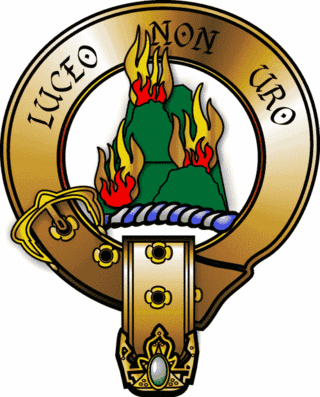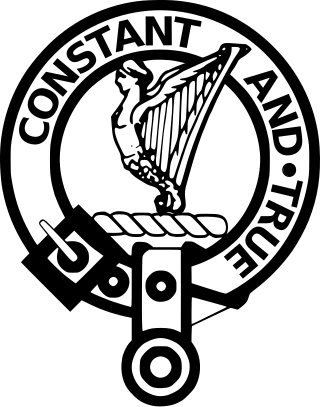Related Research Articles

Earl of Elgin is a title in the Peerage of Scotland, created in 1633 for Thomas Bruce, 3rd Lord Kinloss. He was later created Baron Bruce, of Whorlton in the County of York, in the Peerage of England on 30 July 1641. The Earl of Elgin is the hereditary Clan Chief of Clan Bruce.

Lord Lovat is a title of the rank Lord of Parliament in the Peerage of Scotland. It was created in 1458 for Hugh Fraser by summoning him to the Scottish Parliament as Lord Fraser of Lovat, although the holder is referred to simply as Lord Lovat. It was a separate title from the Scottish feudal lordship of Lovat, already held by the highland Frasers. In 1837 they were created a third title, Baron Lovat, of Lovat in the County of Inverness, in the Peerage of the United Kingdom. The holder is separately and independently the Chief of the highland Clan Fraser of Lovat.

Clan Mackenzie is a Scottish clan, traditionally associated with Kintail and lands in Ross-shire in the Scottish Highlands. Traditional genealogies trace the ancestors of the Mackenzie chiefs to the 12th century. However, the earliest Mackenzie chief recorded by contemporary evidence is Alexander Mackenzie of Kintail who died some time after 1471. Traditionally, during the Wars of Scottish Independence, the Mackenzies supported Robert the Bruce, but feuded with the Earls of Ross in the latter part of the 14th century. During the 15th and 16th-centuries the Mackenzies feuded with the neighboring clans of Munro and MacDonald. In the 17th century the Mackenzie chief was made Earl of Seaforth in the peerage of Scotland. During the Scottish Civil War of the 17th century the Mackenzies largely supported the Royalists. During the Jacobite rising of 1715 the chief and clan of Mackenzie supported the Jacobite cause. However, during the Jacobite rising of 1745 the clan was divided with the chief, Kenneth Mackenzie, Lord Fortrose, supporting the British-Hanoverian Government and his relative, George Mackenzie, 3rd Earl of Cromartie, supporting the Jacobites.

Clan Sutherland also known as House of Sutherland is a Highland Scottish clan whose traditional territory is the shire of Sutherland in the far north of Scotland. The chief of the clan was also the powerful Earl of Sutherland, however in the early 16th century this title passed through marriage to a younger son of the chief of Clan Gordon. The current chief is Alistair Sutherland who holds the title Earl of Sutherland.

Clan Rose is a Scottish clan of the Scottish Highlands.

Kilravock Castle is located near the village of Croy, between Inverness and Nairn, in the council area of Highland, Scotland. It was begun around 1460 and has been the seat of the Clan Rose since that time. The castle is a composite of a 15th-century tower house and several later additions. The original name for the castle was Cill Rathaig; Scottish Gaelic meaning "church at the small circular fort".

Castle Chanonry of Ross, also known as Seaforth Castle, was located in the town of Fortrose, to the north-east of Inverness, on the peninsula known as the Black Isle, Highland, Scotland. Nothing now remains of the castle. The castle was also known as Canonry or Chanonrie of Ross, the former county.

Avoch is a harbour-village located on the south-east coast of the Black Isle, on the Moray Firth.

Beauly Priory was a Valliscaulian monastic community located at "Insula de Achenbady", now Beauly, Inverness-shire. It was probably founded in 1230. It is not known for certain who the founder was, different sources giving Alexander II of Scotland, John Byset, and both. The French monks, along with Bisset, had a strong enough French-speaking presence to give the location and the river the name "beau lieu" and have it pass into English.
Sir Robert Douglas of Glenbervie, 6th Baronet was a notable genealogist responsible for one of the major works on Scottish families, The Baronage of Scotland.

Nicholas Audley, 3rd Baron Audley was born at Heighley Castle, Staffordshire, England to James Audley, 2nd Baron Audley, and was his only surviving son.

George Mackenzie, 2nd Earl of Seaforth was a Highland clan chief and Scottish nobleman, who played an equivocating role in Scotland in the Wars of the Three Kingdoms.
Hector Roy Mackenzie of Gairloch was a Scottish clan chieftain of the Clan Mackenzie, who acquired vast estates in and around Gairloch, Wester Ross as a result of his services to the Scottish crown and challenged his nephew for the chiefship of the clan.
Colin Mackenzie of Kintail, nicknamed "Cam", was a Highland chief of the Scottish clan Mackenzie who greatly increased his ancestral estates through royal favour and a career of vigorous self-aggrandisement.

Redcastle, historically known as Edirdovar and Ederdour, is a medieval castle in Killearnan on the Black Isle, northern Scotland. It is so named from the colour of the stone of which it is built. The castle is now in a state of ruinous disrepair, although it is protected as a category B listed building.
The chiefs of the Scottish highland Clan Mackenzie were historically known as the Mackenzies of Kintail. By tradition the Mackenzie chiefs descend from Kenneth Mackenzie, 1st of Kintail however their earliest ancestor proven by contemporary evidence is Alexander Mackenzie, 6th of Kintail. The chiefly line became the Earls of Seaforth during the 17th century but this title was later forfeited in the 18th century due to support of the Jacobite rising of 1715. The current official chief of the Clan Mackenzie is John Ruaridh Grant Mackenzie, 5th Earl of Cromartie.
Fionnla Dubh mac Gillechriosd is purported to have been a 15th-century Scotsman, who lived in the north-west of Scotland. The Gaelic Fionnla Dubh mac Gillechriosd translates into English as "Fionnla the black, son of Gillechriosd". Fionnla Dubh is known from a late 17th-century traditional account of Clan Macrae; within that account he presented as a prominent ancestor of the clan. The tradition relates that for a time the chief of Clan Mackenzie was absent, and during that time his bastard uncles were causing trouble in the Mackenzies' territories of Kintail and Kinlochewe. Fionnla Dubh was then ordered to retrieve the chief and was successful in his task. From that time onward, says the tradition, the Macraes from the Kintail area rose in prominence amongst their Mackenzie lords. Tradition also states that Fionnla Dubh is an ancestor of the leading lines of the Macraes from Kintail.

Ingram de Balliol, Lord of Redcastle and Urr in Scotland, Dalton in England and Tours-en-Vimeu in France was an Anglo Scoto-French noble.

The Mackenzies of Gairloch were a minor noble Scottish family and one of the senior cadet branches of the Clan Mackenzie, a Scottish clan of the Scottish Highlands.
Rosa Mackenzie Kettle was an English novelist and poet.
References
- Mackenzie, Alexander. History of the Chisholms: With Genealogies of the Principal Families of the Name. United Kingdom, A. & W. Mackenzie, 1891.
- Rose, Hew., Shaw, Lachlan., Innes, Cosmo. A Genealogical Deduction of the Family of Rose of Kilravock. United Kingdom: Constable, 1848.